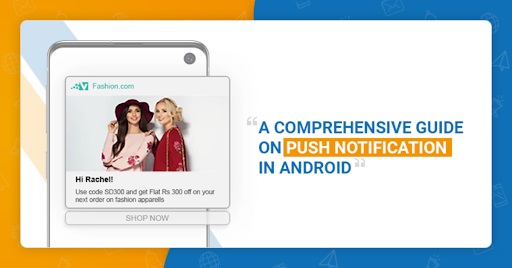Smartphones have opened the market to new possibilities by taking communication to an enhanced level. Naturally, marketers are leveraging several channels that are easily accessible on mobile devices to communicate with their users. Push notification is one such channel, which marketers are finding quite effective while sending marketing messages.
Now, mobile phones primarily use two types of operating systems – Android and iOS. Studies have shown that the number of Android users is more than iOS users. Therefore this blog would focus primarily on the capabilities of an Android phone. However, some of the practices are quite generic, so can be used on either of the operating systems.
Getting started with Push Notifications – The Basics
Push notifications are the pop-ups that your users receive on the top of their movies. Notifications are sent to inform about products, offers, etc. Sometimes these mobile notifications even help them to follow subsequent steps towards conversions. The push notifications in Android from any particular brand are always clubbed together in the notification panel if you send them more than once within a stipulated period of time.
Push notifications are particularly helpful to users as they can get the communicated information without opening any app or website. Therefore, these notifications provide a glimpse of the message you are sending, along with images and abridged product information. If your users want to know further, they can click to go to the intended app/web page.
Tips to optimize your push notification campaigns
1. Number of push notifications
You must respect your users’ privacy before bombarding him with product notifications & information. Sending too many notifications might be irksome for your users. This might lead to unsubscription from your services if they find them irrelevant.
Depending on your business domain, you must restrict the number of notification sent to your users. We should focus more on the quality and design to make notifications more alluring & acceptable. Mobile screen real estate is really a valuable factor, therefore create your notifications with clear intentions along with a high-quality image of the product you are offering.
Pro tip: You can also include multiple product information in a single notification using the carousal app notifications feature. It allows you to include details of up to nine products, viewed through a scrollable notification. Thereby helping you to avoid sending multiple notifications for similar products.
2. Personalizing your android notification
Like any other marketing communication channel, you must put more stress on personalizing your Android notification. You must emphasize more on how you are addressing your users, whether you are using the product information as per their preferences, and if your CTA is describing the action that the users would be taking clearly. For example, if your CTA button says “Buy Now” and on clicking it takes the user to your home page, it could lead to poor user experience. In this type of instance, the users may not convert, or even unsubscribe from your services.
You can also use various techniques like geofencing, user demographics, or their purchase intentions to draft the kind of notifications that are more likely to engage them.
Pro Tip: You can include and personalize two CTAs for your push notifications. This feature will help your users to choose whether they want to know more about the product or choose any other page that you intend to use certain platforms.
3. Re-engagement and behavioral retargeting using Android Notification
You can use push notifications as a tool to re-engage and retarget your users. When your users opt-in to receive your push notifications, they allow you to create a unique identifier for each user, based primarily on their device ID. Along with the device ID, and their online behavior, you can create distinct user personas based on their browsing history, Now, depending on their buying propensity, you can design your push notification to retarget these users to nudge them towards conversion. You can also use the behavioral retargeting parameters to upsell (selling a similar product with a higher value) or cross-sell (selling relevant products that are often associated or related to the actual product users are buying) your products.
Pro Tip: Certain platforms allow you to use an omnichannel user data under a single dashboard so that you have a better understanding of the user behavior across devices and channels. You can use the data from the CRM channels to create a better buyer’s persona and send marketing communications accordingly to retarget them.
4. Trigger-based push notification campaigns
You can use android notification to invoke specific actions from your users called as trigger-based push campaigns. It can help you to streamline your marketing funnel efficiently. Such campaigns can be launched by any push notification platform using the browsing history of users. These notifications act as an added motivation for users to visit your app or website to make the final purchase decisions.
Pro tip: You can also use product labels for trigger-based notifications to add an extra layer of social validation for the products you are communicating about with your users.
Key Takeaway
Push notifications can act as effective motivation for users who are looking to buy products or engage with your business. You can also improve your behavioral retargeting campaigns and bring back the users who haven’t converted yet with notifications. The android notification tips mentioned in this blog can go a long way in optimizing your push campaigns. It may also improve your marketing ROI by enhancing your revenue generation.

